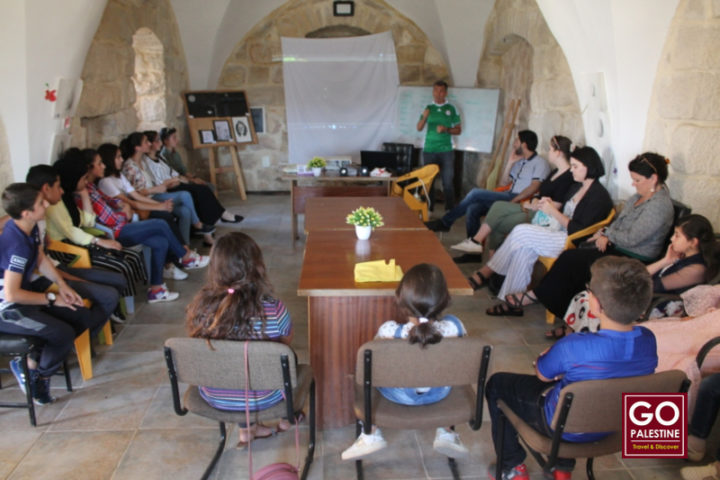If you are interested in volunteering or interning in Palestine, there is no better place than Hebron, known as Al-Khalil in Arabic. The West Bank city of Hebron is considered the cradle of organized religion for Jews, Muslims, and Christians alike, and it is guaranteed to offer an interesting perspective of the Israeli-Palestinian conflict that is second-to-none.
Holy Hebron
Hebron is one of the holiest ancient cities in the Holy Land. It is also considered to be one of the oldest towns in Palestine, and has a claim to being one of the oldest continuously inhabited places on Earth—having been continuously settled for 5,000 years.
Al Khalil means ‘The Friend of God’ and it is believed that the prophet Abraham is buried in the city in the Tomb of the Patriarchs, which is believed to be the collective tomb of Abraham, Isaac, Jacob, and their wives, with the exception of Rachel. Furthermore, Islamic tradition states that Adam and Eve lived in Al Khalil after being exiled from the Garden of Eden. Lastly, the Bible alleges that King David was also called upon by God to relocate to Hebron and reign from there for some seven years.
Tense Hebron
Compared to the rest of the West Bank, Hebron feels notably tenser than most other cities. This is due to the large presence of illegal Jewish settlements within the city center and the division of the city into two separate sections—a distinguishing characteristic of Hebron.
Following the 1995 Oslo Agreement and the 1997 Hebron Agreement, Palestinian cities were placed under exclusive jurisdiction of the Palestinian Authority. These PA controlled cities made and continue to make up “Area A” of the West Bank (For more info about the Areas of the West Bank, see the following article about the Palestinian Authority). Hebron was the one exception to the rule, with the city being split into two separate areas: H1 and H2
Hebron 1(H1) and Hebron 2 (H2)
H1 is controlled exclusively by the Palestinian Authority, makes up about 80% of the city, and is inhabited by some 120,000 Palestinians. In juxtaposition, H2 is controlled exclusively by the Israeli military, makes up about 20% of the city, must be accessed by checkpoints, and is inhabited by around 40,000 Palestinians and some 600 Israeli Jewish settlers.
There are four Jewish settlements within the H2 city center—Avraham Avinu, Beit Romano, Beit Hadassah, and Tel Rumeida. Additionally, there is an outer settlement known as Qiryat Arba, which contains nearly 7000 Jewish settlers. These settlements are widely considered to be illegal by the international community; however, this legality is disputed by the Israeli government.
Effects of Settlements and Occupation on Arab Population
The Palestinian population living in H2 has declined greatly due to the impact of Israeli security measures and the settlements. On a daily basis, residents are denied some of their most basic human rights and face extended curfews, strict restrictions on movement, closure of Palestinian commercial activities, and harassment from settlers. In the Old City, there are currently 18 checkpoints, which cause disruption and tension for Palestinian residents. Those who live in this area must pass through these checkpoints on a daily basis, and often face harassment, interrogations, and searches.
Furthermore, the existence of checkpoints and Israeli military within the Old City has devastated its local economy. Palestinians are barred from using Al-Shuhada Street, a principal commercial thoroughfare and, of the 1829 shops in the Old City, 512 have been closed by military orders for ‘security reasons.’ An additional 1100 shops have also gone out of business as Palestinians are either unable or unwilling to enter the Old City for fear of soldier and settler attacks. Thus, the streets of the Old City are lined with closed shops and the area is often best described as a ‘ghost town.’
Volunteering in Hebron
Having said all of this, spending time in Hebron is critically important to anyone hoping to understand the root of the settlement issue and the Israeli occupation of the West Bank. Because of the nature of the city, volunteers and interns can have a tremendous impact on the local Palestinian population, which is denied basic human rights on a daily basis.
Whether teaching English or engaging in a variety of other programs, such as interning in International Law, Human Rights, or Media, volunteering in Hebron will allow you to both bring new opportunities to the people of Palestine, and sense and instill a sense of humanity within them.
Leisure Time in Hebron
Lastly, the ancient town of Hebron is not only historically significant; it is a city with a wide variety of offerings that are worth exploring in your free time. From the winding streets of the Old City to the traditional glass and pottery factories, Hebron is a city that will captivate your interests and expand your mind.

